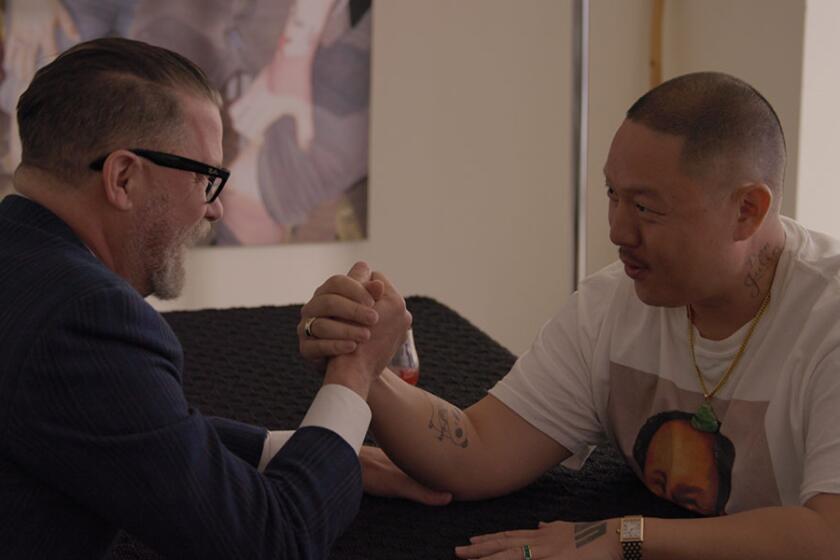After the buzz: Reflections of the last man to see ‘Get Out’ in a theater
The last shall be first, the Bible famously notes. But it also insists the first shall be last, and that was exactly the situation I found myself in with the hugely popular “Get Out.”
Being in the first wave of viewers is practically part of the job definition for a critic. You see the film before it hits theaters so you can advise moviegoers if it’s worth their time. Be there or be very square indeed.
But sometimes, like a knuckleball thrown in the dirt, a film gets past you. Maybe you weren’t a fan of the genre, maybe you didn’t believe friends who raved, maybe there simply wasn’t enough time. Often it doesn’t matter, but sometimes the film you missed becomes the talk of the nation.
Special Report: Can moviegoing be saved? »
If that’s the case, as it was with me and “Get Out,” you feel duty bound to catch up, even if duty catches up with you only after several months have passed.
But if you’re seeing a film so much later than most of America, not to mention all of the nation’s film critics, does that affect how you see it? Would you get the same sensation as those who came before you, or might the passage of time and the inevitable accretion of commentary from both experts and friends make an irreparable difference? And might there be any advice to be gleaned for non-professional moviegoers from that experience?
Some films, I already knew, can survive extended avoidance. For reasons I can no longer remember, I stayed away from Disney’s “Zootopia” for close to forever — eight months, in fact — but when I finally saw it I reacted just the way I was supposed to. Would “Get Out” be any different?
Because the film had become a phenomenon, the matinee performance I went to (I’m not the type to watch horror films at night, if at all) was almost full even though it was months after opening day.
Truly this film’s existence is more interesting than what is actually in it.
Jordan Peele’s horror film-racial satire had debuted at the Sundance Film Festival in January, went into theaters nationwide in February and captivated everyone who saw it. It got a 99% rating on Rotten Tomatoes (244 fresh, only one rotten), was the subject of a New York Times editorial and was a killer at the box office: after 95 days in theaters, an eternity in this day and age, its domestic gross stood at more than $175 million (plus an additional $65.8 million internationally). Not bad for a film that cost less than $5 million to make.
Just reciting all that impressive information underscores the first problem with seeing something late. All moviegoers, whether in the business or otherwise, are capable of being over-hyped, of being told so often how wonderful something is that we go into the theater with a put-up-or-shut-up chip on our shoulders.
This was especially a problem with a film like “Get Out,” part of whose appeal lay in the subversion of expectations. If you anticipated nothing but a standard genre film, the fact that writer-director Peele was making points about America’s racial situation came as a pleasant surprise.
But once that surprise was known (and not knowing it was pretty much impossible because of the waves of publicity and approval), wondering where things would go was not an option, and so a chunk of the film’s appeal evaporated.
Even without detailed information on plot specifics, when an African American photographer (Daniel Kaluuya) visits the seemingly liberal suburban parents (Catherine Keener and Bradley Whitford) of his white girlfriend (Allison Williams) it’s so transparent from the get-go that this family is not what it seems that watching it all play out feels more like a waste of time than it must have to early viewers.
More than that, the film’s notion that we do not live in the post-racial society pundits had announced at Barack Obama’s election can hardly be news in the Black Lives Matter era. Superb documentaries like Raoul Peck’s “I Am Not Your Negro” and Ava DuVernay’s “13th” had made that point with greater eloquence and impact, but they were not horror films with nine-figure grosses.
Perhaps early audiences were entranced by “Get Out” because the bar for social commentary on racial matters coming out of risk-aversive major studios is so low that anything at all is impressive. Truly this film’s existence is more interesting than what is actually in it.
While “Get Out” does make some interesting comments on the kinds of Stepford behavior the dominant culture enforces on minorities, white hypocrisy on race is not exactly a tough target, especially in a film that never makes audiences feel complicit in the characters’ bad behavior. Films that earn close to $200 million just don’t do that.
Would I have had all these aberrant, cranky reactions had I been in the first wave of “Get Out” viewers? Likely some, but not all: Being disappointed after exposure to all that praise was inescapably a factor.
The message here is that waiting to see a film until everyone tells you it’s amazing is not a recommended moviegoing strategy. Get there early or risk being sorry you are there at all.
See the most-read stories in Entertainment this hour »
Movie Trailers
Twitter: @KennethTuran
ALSO:
Jordan Peele on how ‘Get Out’ defied the odds to become a full-blown cultural phenomenon
Review: Clever horror-satire ‘Get Out’ is an overdue Hollywood response to our racial anxiety
The young are returning to theaters — but for these teens, is ‘Baywatch’ worth the time?
More to Read
Only good movies
Get the Indie Focus newsletter, Mark Olsen's weekly guide to the world of cinema.
You may occasionally receive promotional content from the Los Angeles Times.











